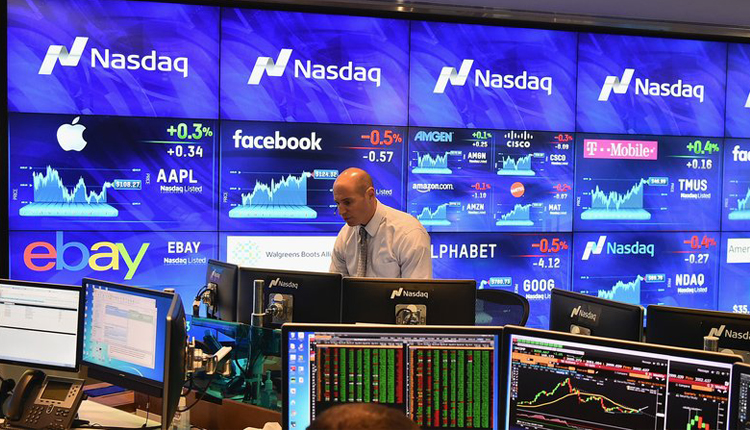U.S. stocks kicked off the week on a sour note Monday as Wall Street braced for more actions against Chinese companies by the Trump administration. The Dow Jones Industrial Average dropped 328.09 points to close at 24,252.80, with Boeing and Intel among the biggest decliners in the index.
The 30-stock index also closed below its 200-day moving average, a key technical level, for the first time since June 2016.
The Dow rebounded slightly in the final hour of trading after Peter Navarro, a top trade adviser to President Donald Trump, said on CNBC that investment restrictions against China and other countries are not immediately forthcoming and that the market was overreacting.
“He basically said ‘hey guys, it’s Trump playing the ‘Art of the Deal’ with China,” said Scott Redler of T3Live.com.
The S&P 500 fell 1.4 percent to 2,717.07, posting its worst day since April 6, when it fell 2.19 percent, as tech declined 2.3 percent. Five of the 11 S&P 500 sectors also closed in correction, or down at least 10 percent from their 52-week high. The Nasdaq composite pulled back 2.1 percent to close at 7,532.01 as Netflix dropped 6.5 percent to lead the FANGs lower.
Harley-Davidson shares fell about 6 percent after the company announced it will shift production of motorcycles headed for Europe to factories outside the U.S. The company sold nearly 40,000 bikes to the European Union, second only to the U.S.
“This is a case where you have widespread optimism and that leaves little room for error,” said Willie Delwiche, investment strategist at Baird. “It leads to a scenario where you sell first and ask questions later.”
The Wall Street Journal reported Sunday that Trump plans to bar several Chinese companies from making investments in U.S. tech. The newspaper also reported that the administration wants to block additional technology exports to China. Both measures are expected to be announced by the end of the week.
Treasury Secretary Steven Mnuchin called the Journal’s story “fake news” in a tweet. He also said, however, that the measure will impact not just China, but all countries.
Increasing trade tensions between the U.S. and its key trade partners, including China, have kept Wall Street on edge. The major indexes finished last week lower after Trump asked the U.S. trade representative to target $200 billion worth of Chinese products for tariffs. Trump also raised the possibility of slapping a 20 percent charge on European cars.
Peter Boockvar, chief investment officer at Bleakley Advisory Group, said in a note there are three goals the administration wants to complete with these tariffs: to protect tech companies from Chinese theft, to lower trade barriers set by other countries relative to the U.S. and lower the trade deficit.
“As for the first concern, we don’t seem to have made any progress addressing with the current tariff plan but are at least calling China out deservingly so. The 2nd one might be gaining some traction in bits and pieces and hopefully continues. The 3rd is only a symptom of everything else,” he said. “Either way, and regardless of how one thinks this should all be handled, the means to the intended end is immediately having negative real world impacts.”
Shares of chipmakers Intel, Micron Technology and Nvidia all fell at least 3.4 percent.
Boeing, Caterpillar and General Motors, all major exporters with significant exposure to China, also fell by 2.3 percent, 2.4 percent and 1.6 percent, respectively. Boeing, Caterpillar and GM were also on track to post large monthly losses, having fallen 5.9 percent, 10.1 percent and 4.9 percent in June, respectively. Deere and U.S. Steel, major exporters as well, are also down more than 6 percent each.
The CBOE Volatility Index (VIX), regarded as the best gauge of fear in the market, traded above 17, rising more than 25 percent.
Overseas markets fell broadly. In Europe, the Stoxx 600 index dropped 2 percent while the German Dax fell 2.5 percent. Treasury yields slipped as investors bought bonds amid the trade tensions. The benchmark 10-year yield fell to 2.882 percent while the two-year yield slipped to 2.545 percent.
Source: CNBC













